Analysing Organisational Behaviour at Argos Limited: A Report
VerifiedAdded on 2023/01/06
|15
|5315
|34
Report
AI Summary
This report provides a comprehensive analysis of organisational behaviour within Argos Limited, a major UK retailer. It explores how organisational culture, power dynamics, and politics influence individual and team behaviour and performance, referencing Handy's culture model and French and Raven's power model. The report evaluates content and process theories of motivation, including ERG theory and Adam's equity theory, and examines motivational techniques used to achieve organisational goals. It further differentiates between effective and ineffective teams, utilizing Tuckman's stages of group development and Belbin's team roles. Finally, the report applies concepts and philosophies of organisational behaviour within the context of Argos Limited, critically analysing the relevance of team development theories and their impact on workplace behaviour. The conclusion provides recommendations based on the analysis of the report.
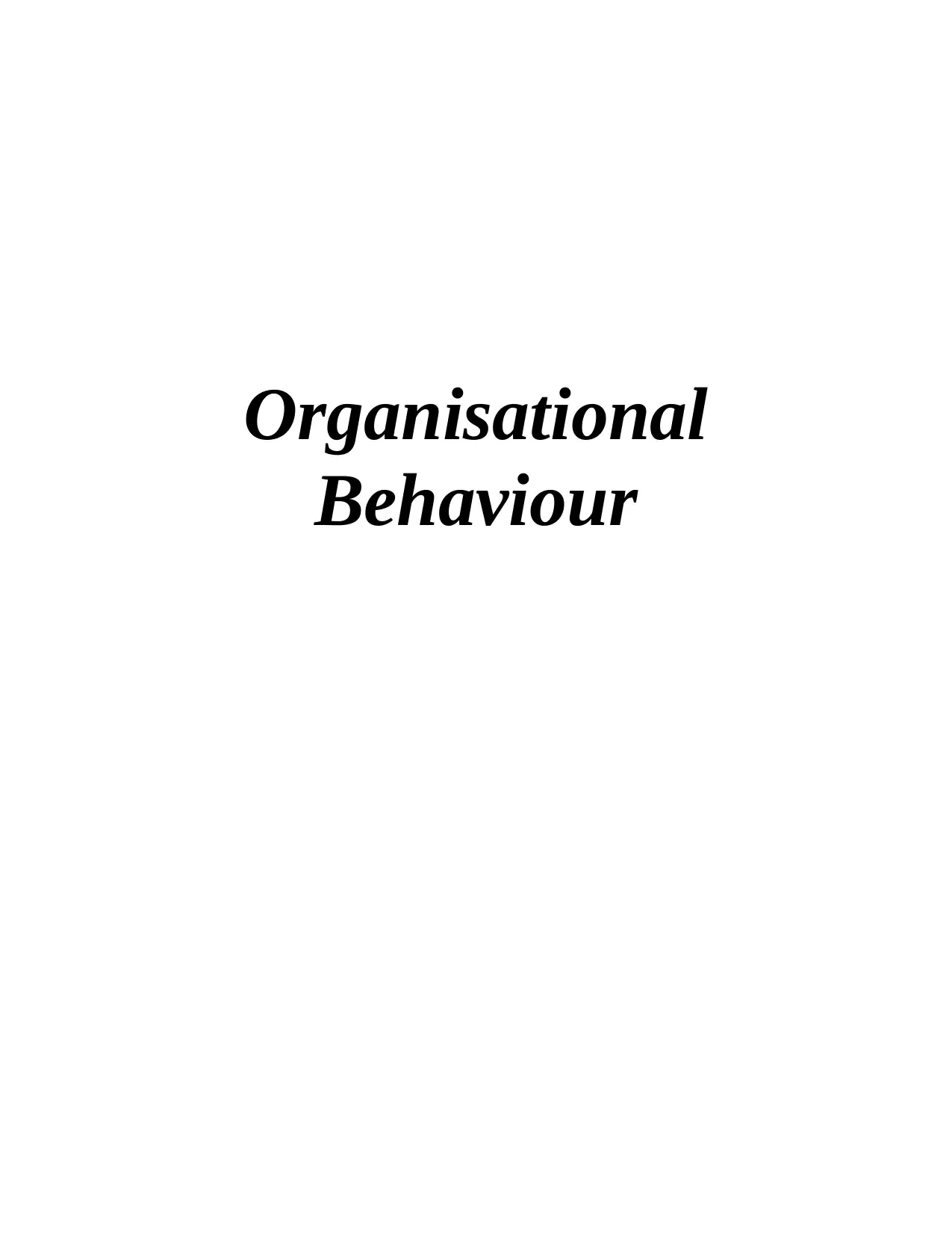
Organisational
Behaviour
Behaviour
Paraphrase This Document
Need a fresh take? Get an instant paraphrase of this document with our AI Paraphraser
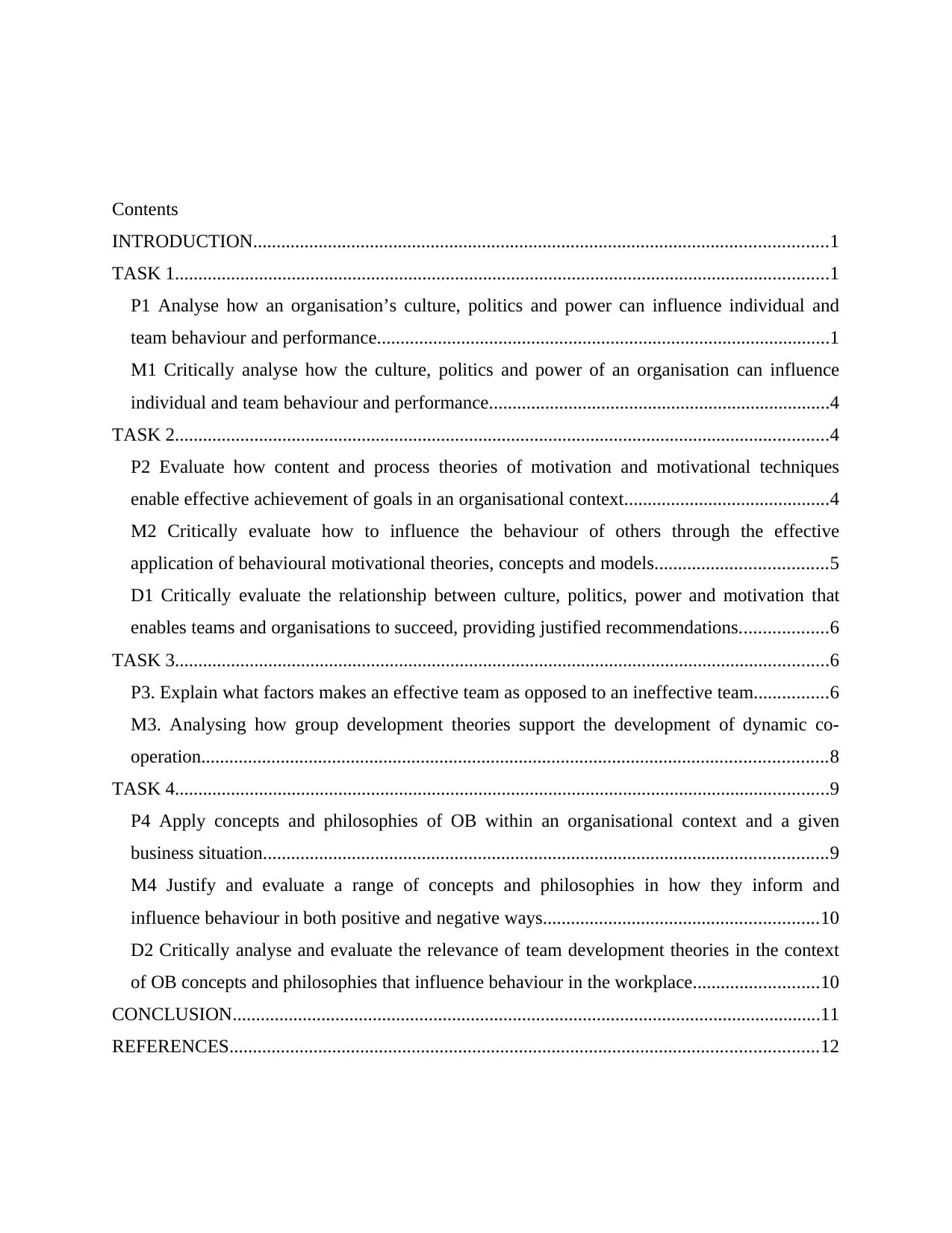
Contents
INTRODUCTION...........................................................................................................................1
TASK 1............................................................................................................................................1
P1 Analyse how an organisation’s culture, politics and power can influence individual and
team behaviour and performance.................................................................................................1
M1 Critically analyse how the culture, politics and power of an organisation can influence
individual and team behaviour and performance.........................................................................4
TASK 2............................................................................................................................................4
P2 Evaluate how content and process theories of motivation and motivational techniques
enable effective achievement of goals in an organisational context............................................4
M2 Critically evaluate how to influence the behaviour of others through the effective
application of behavioural motivational theories, concepts and models.....................................5
D1 Critically evaluate the relationship between culture, politics, power and motivation that
enables teams and organisations to succeed, providing justified recommendations...................6
TASK 3............................................................................................................................................6
P3. Explain what factors makes an effective team as opposed to an ineffective team................6
M3. Analysing how group development theories support the development of dynamic co-
operation......................................................................................................................................8
TASK 4............................................................................................................................................9
P4 Apply concepts and philosophies of OB within an organisational context and a given
business situation.........................................................................................................................9
M4 Justify and evaluate a range of concepts and philosophies in how they inform and
influence behaviour in both positive and negative ways...........................................................10
D2 Critically analyse and evaluate the relevance of team development theories in the context
of OB concepts and philosophies that influence behaviour in the workplace...........................10
CONCLUSION..............................................................................................................................11
REFERENCES..............................................................................................................................12
INTRODUCTION...........................................................................................................................1
TASK 1............................................................................................................................................1
P1 Analyse how an organisation’s culture, politics and power can influence individual and
team behaviour and performance.................................................................................................1
M1 Critically analyse how the culture, politics and power of an organisation can influence
individual and team behaviour and performance.........................................................................4
TASK 2............................................................................................................................................4
P2 Evaluate how content and process theories of motivation and motivational techniques
enable effective achievement of goals in an organisational context............................................4
M2 Critically evaluate how to influence the behaviour of others through the effective
application of behavioural motivational theories, concepts and models.....................................5
D1 Critically evaluate the relationship between culture, politics, power and motivation that
enables teams and organisations to succeed, providing justified recommendations...................6
TASK 3............................................................................................................................................6
P3. Explain what factors makes an effective team as opposed to an ineffective team................6
M3. Analysing how group development theories support the development of dynamic co-
operation......................................................................................................................................8
TASK 4............................................................................................................................................9
P4 Apply concepts and philosophies of OB within an organisational context and a given
business situation.........................................................................................................................9
M4 Justify and evaluate a range of concepts and philosophies in how they inform and
influence behaviour in both positive and negative ways...........................................................10
D2 Critically analyse and evaluate the relevance of team development theories in the context
of OB concepts and philosophies that influence behaviour in the workplace...........................10
CONCLUSION..............................................................................................................................11
REFERENCES..............................................................................................................................12
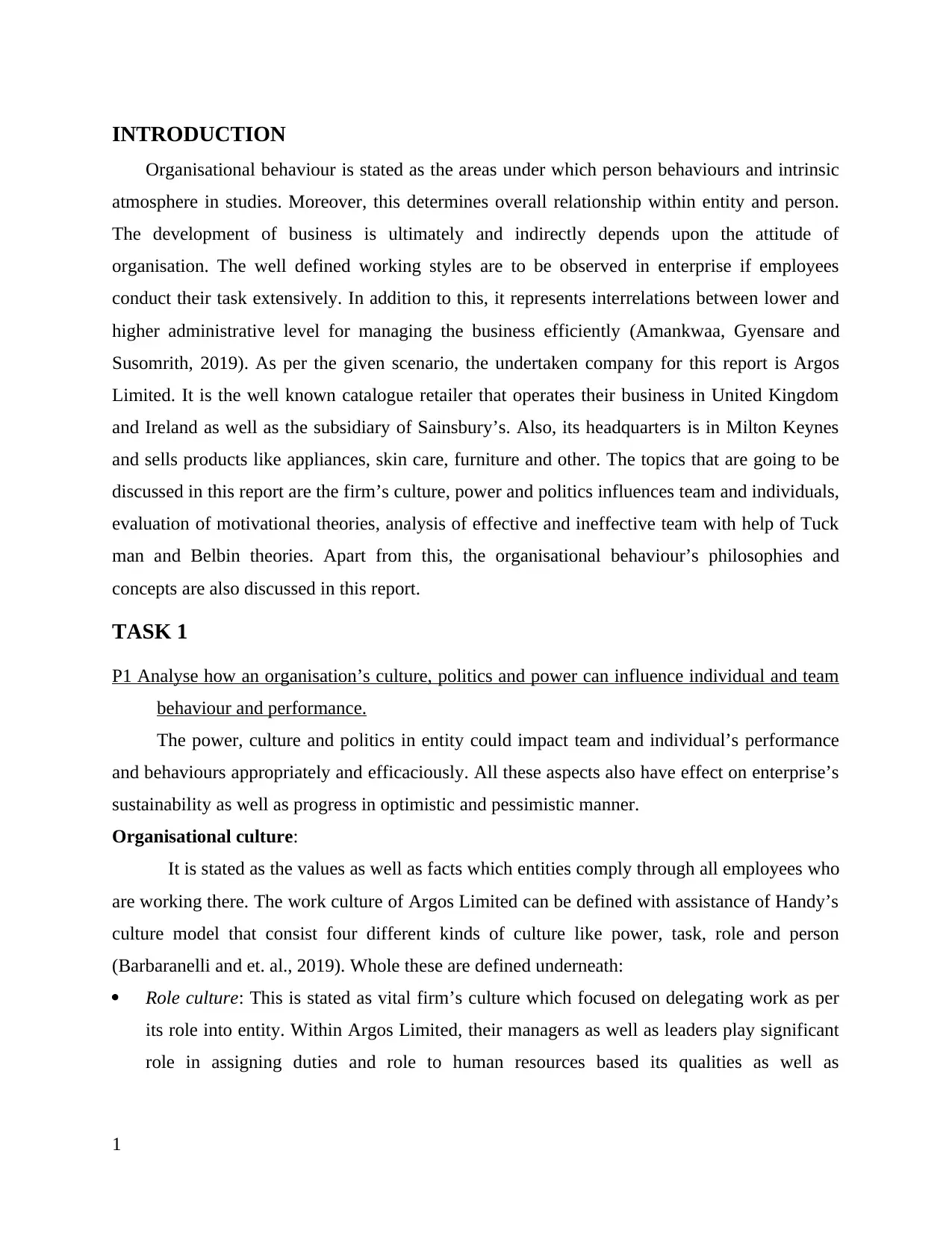
INTRODUCTION
Organisational behaviour is stated as the areas under which person behaviours and intrinsic
atmosphere in studies. Moreover, this determines overall relationship within entity and person.
The development of business is ultimately and indirectly depends upon the attitude of
organisation. The well defined working styles are to be observed in enterprise if employees
conduct their task extensively. In addition to this, it represents interrelations between lower and
higher administrative level for managing the business efficiently (Amankwaa, Gyensare and
Susomrith, 2019). As per the given scenario, the undertaken company for this report is Argos
Limited. It is the well known catalogue retailer that operates their business in United Kingdom
and Ireland as well as the subsidiary of Sainsbury’s. Also, its headquarters is in Milton Keynes
and sells products like appliances, skin care, furniture and other. The topics that are going to be
discussed in this report are the firm’s culture, power and politics influences team and individuals,
evaluation of motivational theories, analysis of effective and ineffective team with help of Tuck
man and Belbin theories. Apart from this, the organisational behaviour’s philosophies and
concepts are also discussed in this report.
TASK 1
P1 Analyse how an organisation’s culture, politics and power can influence individual and team
behaviour and performance.
The power, culture and politics in entity could impact team and individual’s performance
and behaviours appropriately and efficaciously. All these aspects also have effect on enterprise’s
sustainability as well as progress in optimistic and pessimistic manner.
Organisational culture:
It is stated as the values as well as facts which entities comply through all employees who
are working there. The work culture of Argos Limited can be defined with assistance of Handy’s
culture model that consist four different kinds of culture like power, task, role and person
(Barbaranelli and et. al., 2019). Whole these are defined underneath:
Role culture: This is stated as vital firm’s culture which focused on delegating work as per
its role into entity. Within Argos Limited, their managers as well as leaders play significant
role in assigning duties and role to human resources based its qualities as well as
1
Organisational behaviour is stated as the areas under which person behaviours and intrinsic
atmosphere in studies. Moreover, this determines overall relationship within entity and person.
The development of business is ultimately and indirectly depends upon the attitude of
organisation. The well defined working styles are to be observed in enterprise if employees
conduct their task extensively. In addition to this, it represents interrelations between lower and
higher administrative level for managing the business efficiently (Amankwaa, Gyensare and
Susomrith, 2019). As per the given scenario, the undertaken company for this report is Argos
Limited. It is the well known catalogue retailer that operates their business in United Kingdom
and Ireland as well as the subsidiary of Sainsbury’s. Also, its headquarters is in Milton Keynes
and sells products like appliances, skin care, furniture and other. The topics that are going to be
discussed in this report are the firm’s culture, power and politics influences team and individuals,
evaluation of motivational theories, analysis of effective and ineffective team with help of Tuck
man and Belbin theories. Apart from this, the organisational behaviour’s philosophies and
concepts are also discussed in this report.
TASK 1
P1 Analyse how an organisation’s culture, politics and power can influence individual and team
behaviour and performance.
The power, culture and politics in entity could impact team and individual’s performance
and behaviours appropriately and efficaciously. All these aspects also have effect on enterprise’s
sustainability as well as progress in optimistic and pessimistic manner.
Organisational culture:
It is stated as the values as well as facts which entities comply through all employees who
are working there. The work culture of Argos Limited can be defined with assistance of Handy’s
culture model that consist four different kinds of culture like power, task, role and person
(Barbaranelli and et. al., 2019). Whole these are defined underneath:
Role culture: This is stated as vital firm’s culture which focused on delegating work as per
its role into entity. Within Argos Limited, their managers as well as leaders play significant
role in assigning duties and role to human resources based its qualities as well as
1
⊘ This is a preview!⊘
Do you want full access?
Subscribe today to unlock all pages.

Trusted by 1+ million students worldwide
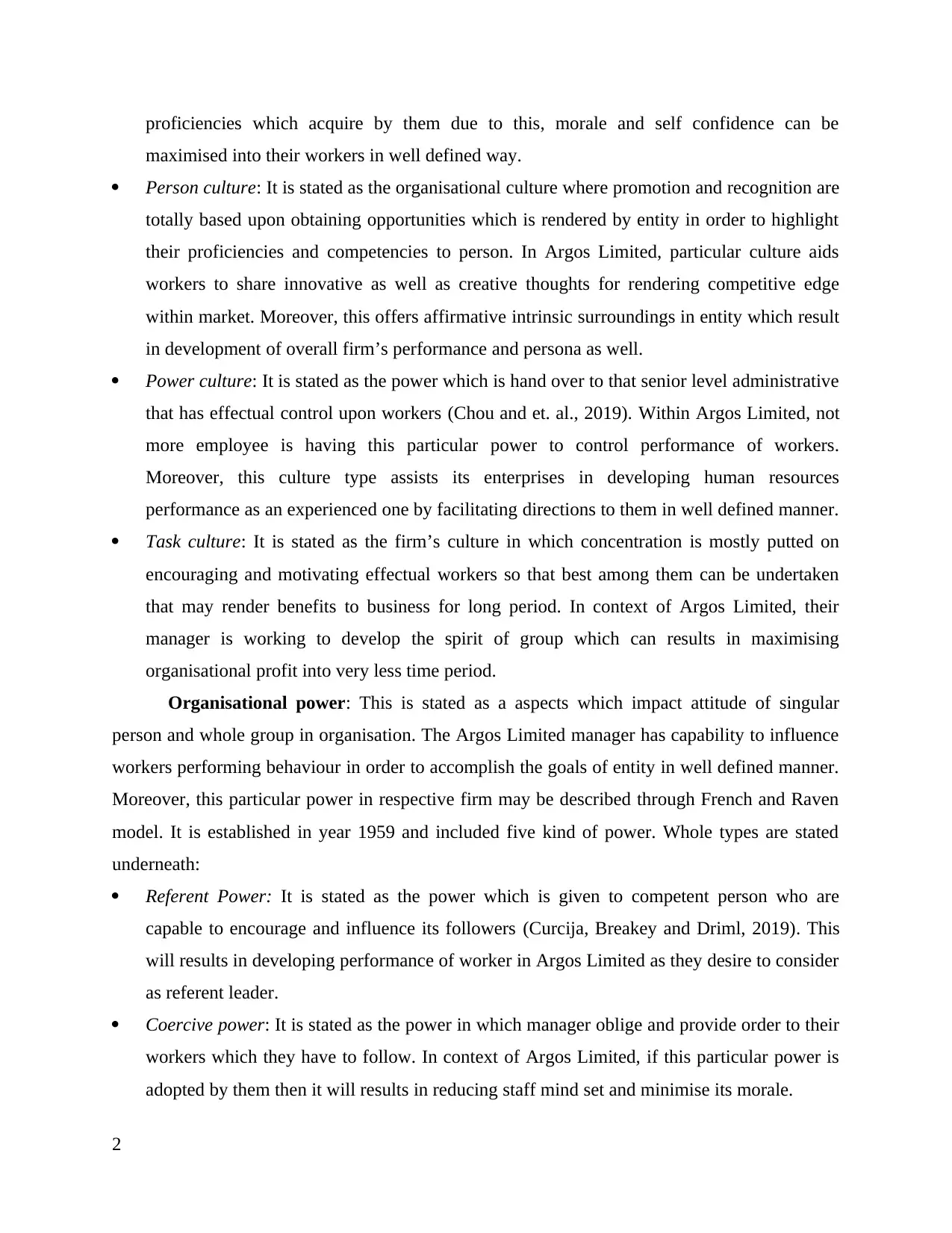
proficiencies which acquire by them due to this, morale and self confidence can be
maximised into their workers in well defined way.
Person culture: It is stated as the organisational culture where promotion and recognition are
totally based upon obtaining opportunities which is rendered by entity in order to highlight
their proficiencies and competencies to person. In Argos Limited, particular culture aids
workers to share innovative as well as creative thoughts for rendering competitive edge
within market. Moreover, this offers affirmative intrinsic surroundings in entity which result
in development of overall firm’s performance and persona as well.
Power culture: It is stated as the power which is hand over to that senior level administrative
that has effectual control upon workers (Chou and et. al., 2019). Within Argos Limited, not
more employee is having this particular power to control performance of workers.
Moreover, this culture type assists its enterprises in developing human resources
performance as an experienced one by facilitating directions to them in well defined manner.
Task culture: It is stated as the firm’s culture in which concentration is mostly putted on
encouraging and motivating effectual workers so that best among them can be undertaken
that may render benefits to business for long period. In context of Argos Limited, their
manager is working to develop the spirit of group which can results in maximising
organisational profit into very less time period.
Organisational power: This is stated as a aspects which impact attitude of singular
person and whole group in organisation. The Argos Limited manager has capability to influence
workers performing behaviour in order to accomplish the goals of entity in well defined manner.
Moreover, this particular power in respective firm may be described through French and Raven
model. It is established in year 1959 and included five kind of power. Whole types are stated
underneath:
Referent Power: It is stated as the power which is given to competent person who are
capable to encourage and influence its followers (Curcija, Breakey and Driml, 2019). This
will results in developing performance of worker in Argos Limited as they desire to consider
as referent leader.
Coercive power: It is stated as the power in which manager oblige and provide order to their
workers which they have to follow. In context of Argos Limited, if this particular power is
adopted by them then it will results in reducing staff mind set and minimise its morale.
2
maximised into their workers in well defined way.
Person culture: It is stated as the organisational culture where promotion and recognition are
totally based upon obtaining opportunities which is rendered by entity in order to highlight
their proficiencies and competencies to person. In Argos Limited, particular culture aids
workers to share innovative as well as creative thoughts for rendering competitive edge
within market. Moreover, this offers affirmative intrinsic surroundings in entity which result
in development of overall firm’s performance and persona as well.
Power culture: It is stated as the power which is hand over to that senior level administrative
that has effectual control upon workers (Chou and et. al., 2019). Within Argos Limited, not
more employee is having this particular power to control performance of workers.
Moreover, this culture type assists its enterprises in developing human resources
performance as an experienced one by facilitating directions to them in well defined manner.
Task culture: It is stated as the firm’s culture in which concentration is mostly putted on
encouraging and motivating effectual workers so that best among them can be undertaken
that may render benefits to business for long period. In context of Argos Limited, their
manager is working to develop the spirit of group which can results in maximising
organisational profit into very less time period.
Organisational power: This is stated as a aspects which impact attitude of singular
person and whole group in organisation. The Argos Limited manager has capability to influence
workers performing behaviour in order to accomplish the goals of entity in well defined manner.
Moreover, this particular power in respective firm may be described through French and Raven
model. It is established in year 1959 and included five kind of power. Whole types are stated
underneath:
Referent Power: It is stated as the power which is given to competent person who are
capable to encourage and influence its followers (Curcija, Breakey and Driml, 2019). This
will results in developing performance of worker in Argos Limited as they desire to consider
as referent leader.
Coercive power: It is stated as the power in which manager oblige and provide order to their
workers which they have to follow. In context of Argos Limited, if this particular power is
adopted by them then it will results in reducing staff mind set and minimise its morale.
2
Paraphrase This Document
Need a fresh take? Get an instant paraphrase of this document with our AI Paraphraser
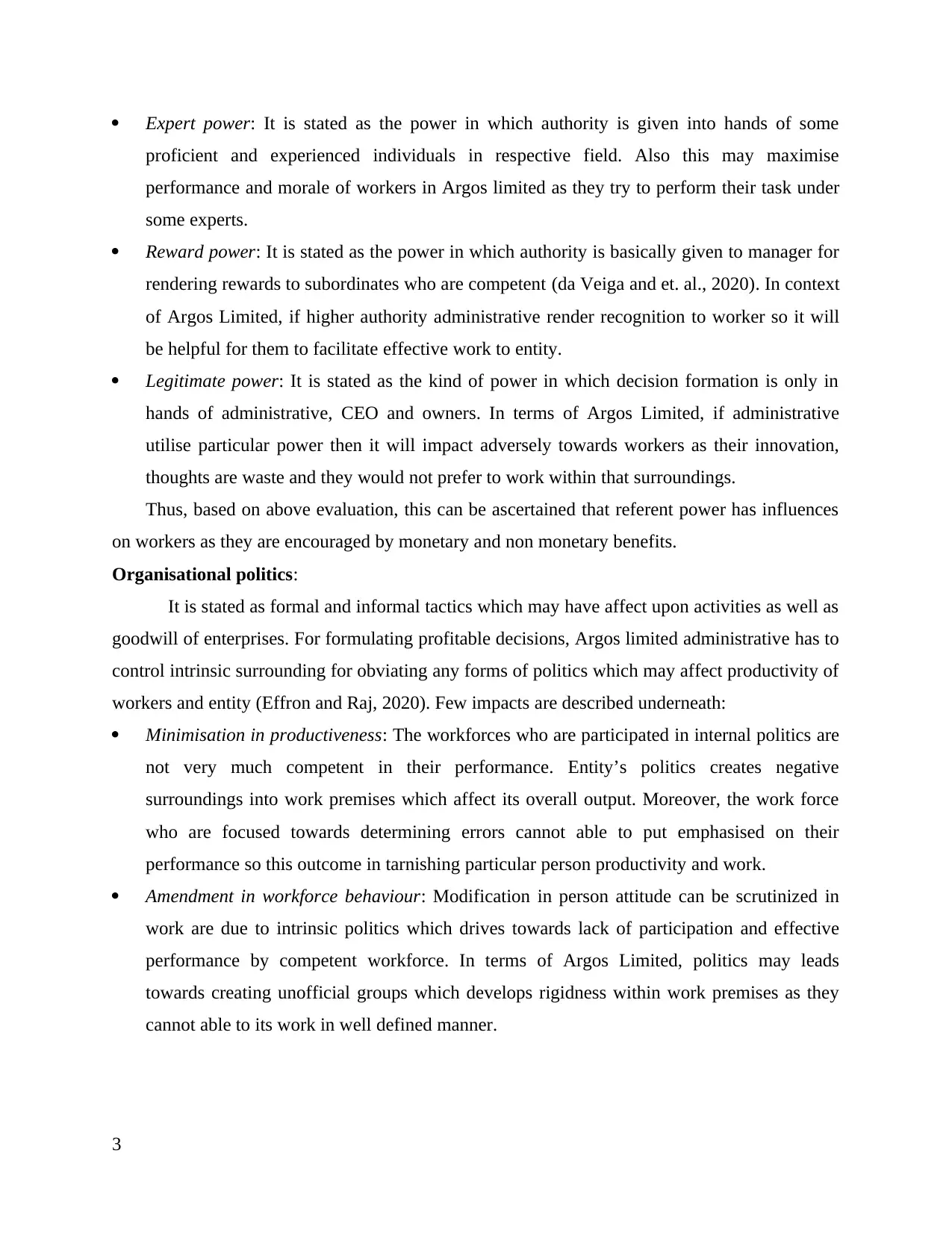
Expert power: It is stated as the power in which authority is given into hands of some
proficient and experienced individuals in respective field. Also this may maximise
performance and morale of workers in Argos limited as they try to perform their task under
some experts.
Reward power: It is stated as the power in which authority is basically given to manager for
rendering rewards to subordinates who are competent (da Veiga and et. al., 2020). In context
of Argos Limited, if higher authority administrative render recognition to worker so it will
be helpful for them to facilitate effective work to entity.
Legitimate power: It is stated as the kind of power in which decision formation is only in
hands of administrative, CEO and owners. In terms of Argos Limited, if administrative
utilise particular power then it will impact adversely towards workers as their innovation,
thoughts are waste and they would not prefer to work within that surroundings.
Thus, based on above evaluation, this can be ascertained that referent power has influences
on workers as they are encouraged by monetary and non monetary benefits.
Organisational politics:
It is stated as formal and informal tactics which may have affect upon activities as well as
goodwill of enterprises. For formulating profitable decisions, Argos limited administrative has to
control intrinsic surrounding for obviating any forms of politics which may affect productivity of
workers and entity (Effron and Raj, 2020). Few impacts are described underneath:
Minimisation in productiveness: The workforces who are participated in internal politics are
not very much competent in their performance. Entity’s politics creates negative
surroundings into work premises which affect its overall output. Moreover, the work force
who are focused towards determining errors cannot able to put emphasised on their
performance so this outcome in tarnishing particular person productivity and work.
Amendment in workforce behaviour: Modification in person attitude can be scrutinized in
work are due to intrinsic politics which drives towards lack of participation and effective
performance by competent workforce. In terms of Argos Limited, politics may leads
towards creating unofficial groups which develops rigidness within work premises as they
cannot able to its work in well defined manner.
3
proficient and experienced individuals in respective field. Also this may maximise
performance and morale of workers in Argos limited as they try to perform their task under
some experts.
Reward power: It is stated as the power in which authority is basically given to manager for
rendering rewards to subordinates who are competent (da Veiga and et. al., 2020). In context
of Argos Limited, if higher authority administrative render recognition to worker so it will
be helpful for them to facilitate effective work to entity.
Legitimate power: It is stated as the kind of power in which decision formation is only in
hands of administrative, CEO and owners. In terms of Argos Limited, if administrative
utilise particular power then it will impact adversely towards workers as their innovation,
thoughts are waste and they would not prefer to work within that surroundings.
Thus, based on above evaluation, this can be ascertained that referent power has influences
on workers as they are encouraged by monetary and non monetary benefits.
Organisational politics:
It is stated as formal and informal tactics which may have affect upon activities as well as
goodwill of enterprises. For formulating profitable decisions, Argos limited administrative has to
control intrinsic surrounding for obviating any forms of politics which may affect productivity of
workers and entity (Effron and Raj, 2020). Few impacts are described underneath:
Minimisation in productiveness: The workforces who are participated in internal politics are
not very much competent in their performance. Entity’s politics creates negative
surroundings into work premises which affect its overall output. Moreover, the work force
who are focused towards determining errors cannot able to put emphasised on their
performance so this outcome in tarnishing particular person productivity and work.
Amendment in workforce behaviour: Modification in person attitude can be scrutinized in
work are due to intrinsic politics which drives towards lack of participation and effective
performance by competent workforce. In terms of Argos Limited, politics may leads
towards creating unofficial groups which develops rigidness within work premises as they
cannot able to its work in well defined manner.
3
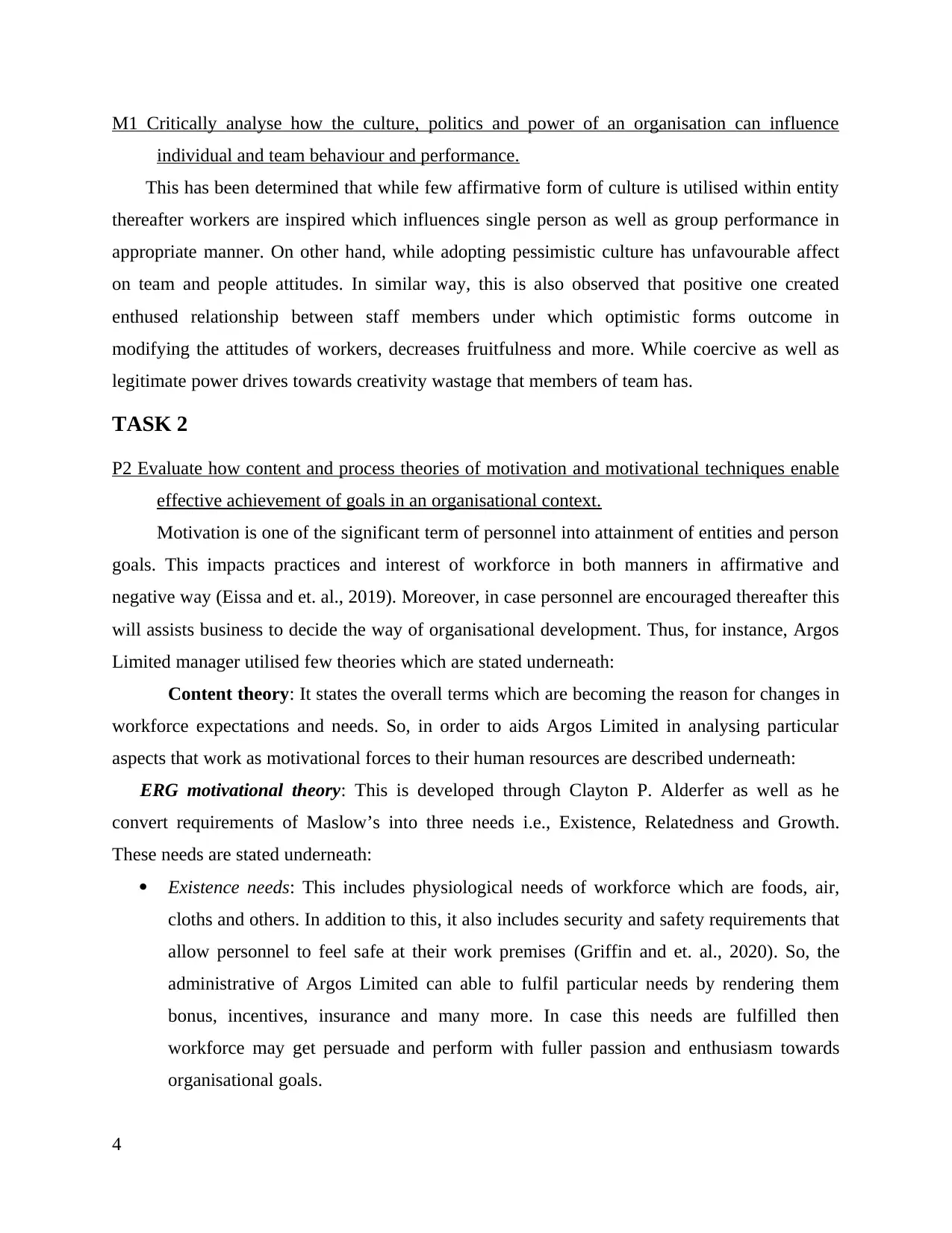
M1 Critically analyse how the culture, politics and power of an organisation can influence
individual and team behaviour and performance.
This has been determined that while few affirmative form of culture is utilised within entity
thereafter workers are inspired which influences single person as well as group performance in
appropriate manner. On other hand, while adopting pessimistic culture has unfavourable affect
on team and people attitudes. In similar way, this is also observed that positive one created
enthused relationship between staff members under which optimistic forms outcome in
modifying the attitudes of workers, decreases fruitfulness and more. While coercive as well as
legitimate power drives towards creativity wastage that members of team has.
TASK 2
P2 Evaluate how content and process theories of motivation and motivational techniques enable
effective achievement of goals in an organisational context.
Motivation is one of the significant term of personnel into attainment of entities and person
goals. This impacts practices and interest of workforce in both manners in affirmative and
negative way (Eissa and et. al., 2019). Moreover, in case personnel are encouraged thereafter this
will assists business to decide the way of organisational development. Thus, for instance, Argos
Limited manager utilised few theories which are stated underneath:
Content theory: It states the overall terms which are becoming the reason for changes in
workforce expectations and needs. So, in order to aids Argos Limited in analysing particular
aspects that work as motivational forces to their human resources are described underneath:
ERG motivational theory: This is developed through Clayton P. Alderfer as well as he
convert requirements of Maslow’s into three needs i.e., Existence, Relatedness and Growth.
These needs are stated underneath:
Existence needs: This includes physiological needs of workforce which are foods, air,
cloths and others. In addition to this, it also includes security and safety requirements that
allow personnel to feel safe at their work premises (Griffin and et. al., 2020). So, the
administrative of Argos Limited can able to fulfil particular needs by rendering them
bonus, incentives, insurance and many more. In case this needs are fulfilled then
workforce may get persuade and perform with fuller passion and enthusiasm towards
organisational goals.
4
individual and team behaviour and performance.
This has been determined that while few affirmative form of culture is utilised within entity
thereafter workers are inspired which influences single person as well as group performance in
appropriate manner. On other hand, while adopting pessimistic culture has unfavourable affect
on team and people attitudes. In similar way, this is also observed that positive one created
enthused relationship between staff members under which optimistic forms outcome in
modifying the attitudes of workers, decreases fruitfulness and more. While coercive as well as
legitimate power drives towards creativity wastage that members of team has.
TASK 2
P2 Evaluate how content and process theories of motivation and motivational techniques enable
effective achievement of goals in an organisational context.
Motivation is one of the significant term of personnel into attainment of entities and person
goals. This impacts practices and interest of workforce in both manners in affirmative and
negative way (Eissa and et. al., 2019). Moreover, in case personnel are encouraged thereafter this
will assists business to decide the way of organisational development. Thus, for instance, Argos
Limited manager utilised few theories which are stated underneath:
Content theory: It states the overall terms which are becoming the reason for changes in
workforce expectations and needs. So, in order to aids Argos Limited in analysing particular
aspects that work as motivational forces to their human resources are described underneath:
ERG motivational theory: This is developed through Clayton P. Alderfer as well as he
convert requirements of Maslow’s into three needs i.e., Existence, Relatedness and Growth.
These needs are stated underneath:
Existence needs: This includes physiological needs of workforce which are foods, air,
cloths and others. In addition to this, it also includes security and safety requirements that
allow personnel to feel safe at their work premises (Griffin and et. al., 2020). So, the
administrative of Argos Limited can able to fulfil particular needs by rendering them
bonus, incentives, insurance and many more. In case this needs are fulfilled then
workforce may get persuade and perform with fuller passion and enthusiasm towards
organisational goals.
4
⊘ This is a preview!⊘
Do you want full access?
Subscribe today to unlock all pages.

Trusted by 1+ million students worldwide
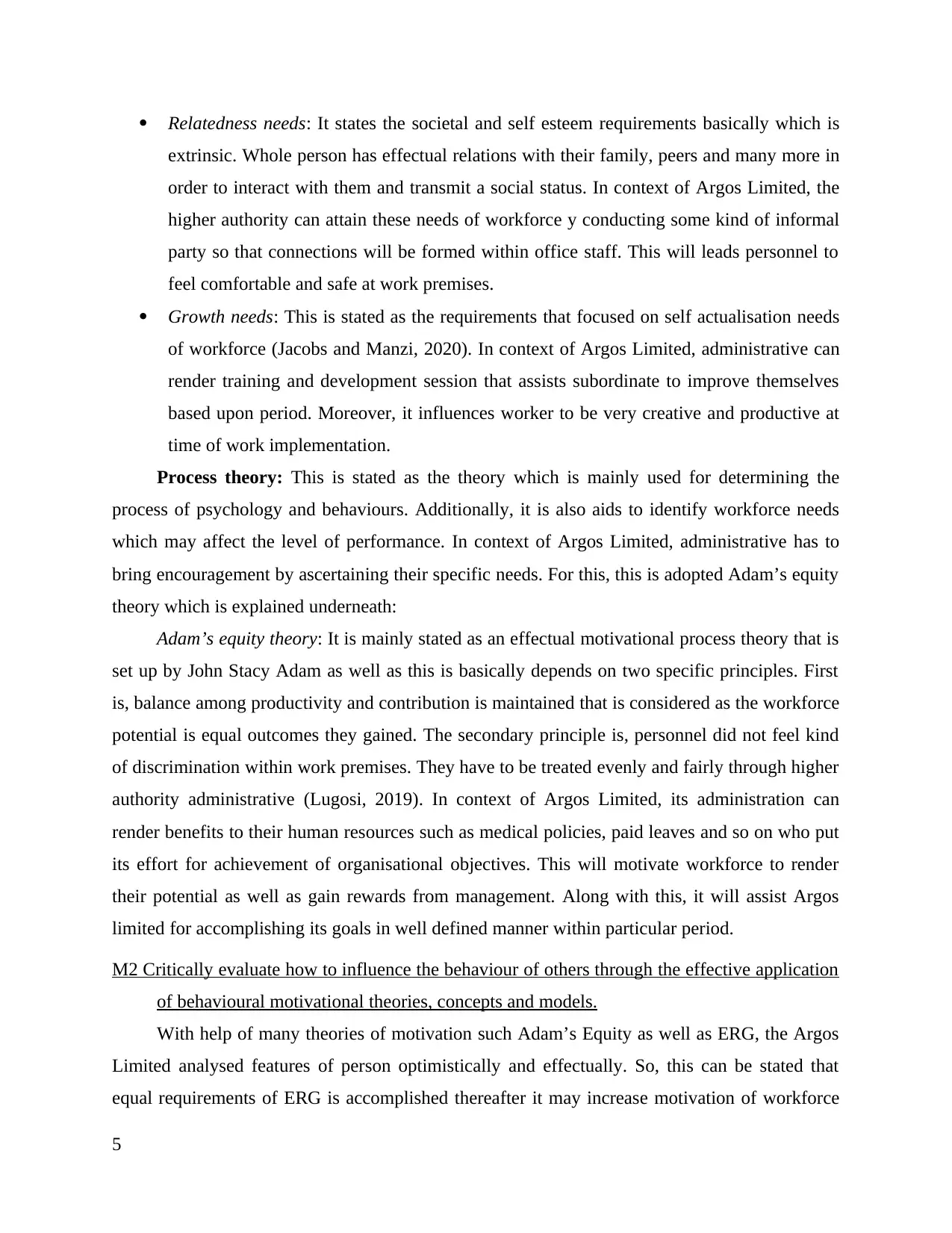
Relatedness needs: It states the societal and self esteem requirements basically which is
extrinsic. Whole person has effectual relations with their family, peers and many more in
order to interact with them and transmit a social status. In context of Argos Limited, the
higher authority can attain these needs of workforce y conducting some kind of informal
party so that connections will be formed within office staff. This will leads personnel to
feel comfortable and safe at work premises.
Growth needs: This is stated as the requirements that focused on self actualisation needs
of workforce (Jacobs and Manzi, 2020). In context of Argos Limited, administrative can
render training and development session that assists subordinate to improve themselves
based upon period. Moreover, it influences worker to be very creative and productive at
time of work implementation.
Process theory: This is stated as the theory which is mainly used for determining the
process of psychology and behaviours. Additionally, it is also aids to identify workforce needs
which may affect the level of performance. In context of Argos Limited, administrative has to
bring encouragement by ascertaining their specific needs. For this, this is adopted Adam’s equity
theory which is explained underneath:
Adam’s equity theory: It is mainly stated as an effectual motivational process theory that is
set up by John Stacy Adam as well as this is basically depends on two specific principles. First
is, balance among productivity and contribution is maintained that is considered as the workforce
potential is equal outcomes they gained. The secondary principle is, personnel did not feel kind
of discrimination within work premises. They have to be treated evenly and fairly through higher
authority administrative (Lugosi, 2019). In context of Argos Limited, its administration can
render benefits to their human resources such as medical policies, paid leaves and so on who put
its effort for achievement of organisational objectives. This will motivate workforce to render
their potential as well as gain rewards from management. Along with this, it will assist Argos
limited for accomplishing its goals in well defined manner within particular period.
M2 Critically evaluate how to influence the behaviour of others through the effective application
of behavioural motivational theories, concepts and models.
With help of many theories of motivation such Adam’s Equity as well as ERG, the Argos
Limited analysed features of person optimistically and effectually. So, this can be stated that
equal requirements of ERG is accomplished thereafter it may increase motivation of workforce
5
extrinsic. Whole person has effectual relations with their family, peers and many more in
order to interact with them and transmit a social status. In context of Argos Limited, the
higher authority can attain these needs of workforce y conducting some kind of informal
party so that connections will be formed within office staff. This will leads personnel to
feel comfortable and safe at work premises.
Growth needs: This is stated as the requirements that focused on self actualisation needs
of workforce (Jacobs and Manzi, 2020). In context of Argos Limited, administrative can
render training and development session that assists subordinate to improve themselves
based upon period. Moreover, it influences worker to be very creative and productive at
time of work implementation.
Process theory: This is stated as the theory which is mainly used for determining the
process of psychology and behaviours. Additionally, it is also aids to identify workforce needs
which may affect the level of performance. In context of Argos Limited, administrative has to
bring encouragement by ascertaining their specific needs. For this, this is adopted Adam’s equity
theory which is explained underneath:
Adam’s equity theory: It is mainly stated as an effectual motivational process theory that is
set up by John Stacy Adam as well as this is basically depends on two specific principles. First
is, balance among productivity and contribution is maintained that is considered as the workforce
potential is equal outcomes they gained. The secondary principle is, personnel did not feel kind
of discrimination within work premises. They have to be treated evenly and fairly through higher
authority administrative (Lugosi, 2019). In context of Argos Limited, its administration can
render benefits to their human resources such as medical policies, paid leaves and so on who put
its effort for achievement of organisational objectives. This will motivate workforce to render
their potential as well as gain rewards from management. Along with this, it will assist Argos
limited for accomplishing its goals in well defined manner within particular period.
M2 Critically evaluate how to influence the behaviour of others through the effective application
of behavioural motivational theories, concepts and models.
With help of many theories of motivation such Adam’s Equity as well as ERG, the Argos
Limited analysed features of person optimistically and effectually. So, this can be stated that
equal requirements of ERG is accomplished thereafter it may increase motivation of workforce
5
Paraphrase This Document
Need a fresh take? Get an instant paraphrase of this document with our AI Paraphraser
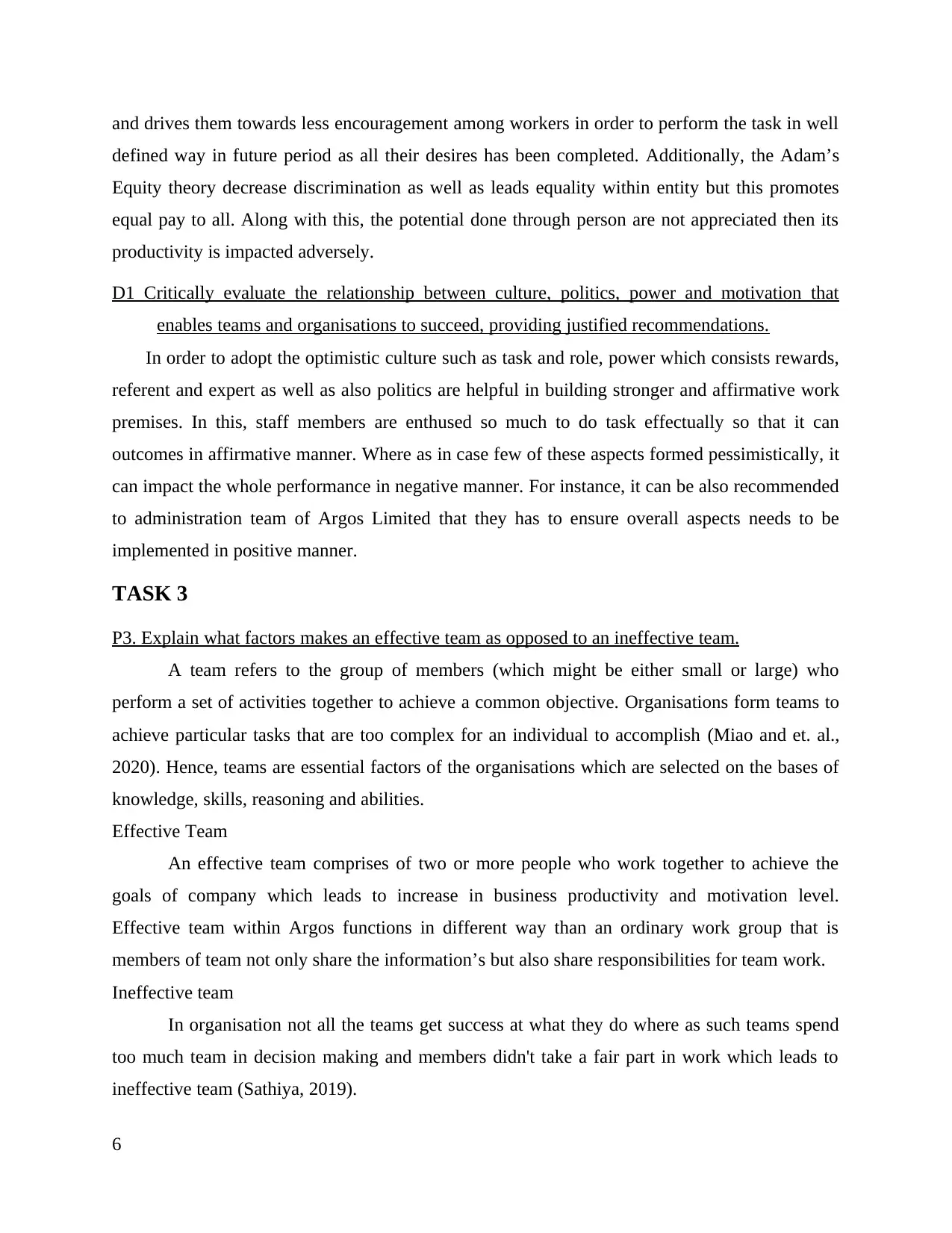
and drives them towards less encouragement among workers in order to perform the task in well
defined way in future period as all their desires has been completed. Additionally, the Adam’s
Equity theory decrease discrimination as well as leads equality within entity but this promotes
equal pay to all. Along with this, the potential done through person are not appreciated then its
productivity is impacted adversely.
D1 Critically evaluate the relationship between culture, politics, power and motivation that
enables teams and organisations to succeed, providing justified recommendations.
In order to adopt the optimistic culture such as task and role, power which consists rewards,
referent and expert as well as also politics are helpful in building stronger and affirmative work
premises. In this, staff members are enthused so much to do task effectually so that it can
outcomes in affirmative manner. Where as in case few of these aspects formed pessimistically, it
can impact the whole performance in negative manner. For instance, it can be also recommended
to administration team of Argos Limited that they has to ensure overall aspects needs to be
implemented in positive manner.
TASK 3
P3. Explain what factors makes an effective team as opposed to an ineffective team.
A team refers to the group of members (which might be either small or large) who
perform a set of activities together to achieve a common objective. Organisations form teams to
achieve particular tasks that are too complex for an individual to accomplish (Miao and et. al.,
2020). Hence, teams are essential factors of the organisations which are selected on the bases of
knowledge, skills, reasoning and abilities.
Effective Team
An effective team comprises of two or more people who work together to achieve the
goals of company which leads to increase in business productivity and motivation level.
Effective team within Argos functions in different way than an ordinary work group that is
members of team not only share the information’s but also share responsibilities for team work.
Ineffective team
In organisation not all the teams get success at what they do where as such teams spend
too much team in decision making and members didn't take a fair part in work which leads to
ineffective team (Sathiya, 2019).
6
defined way in future period as all their desires has been completed. Additionally, the Adam’s
Equity theory decrease discrimination as well as leads equality within entity but this promotes
equal pay to all. Along with this, the potential done through person are not appreciated then its
productivity is impacted adversely.
D1 Critically evaluate the relationship between culture, politics, power and motivation that
enables teams and organisations to succeed, providing justified recommendations.
In order to adopt the optimistic culture such as task and role, power which consists rewards,
referent and expert as well as also politics are helpful in building stronger and affirmative work
premises. In this, staff members are enthused so much to do task effectually so that it can
outcomes in affirmative manner. Where as in case few of these aspects formed pessimistically, it
can impact the whole performance in negative manner. For instance, it can be also recommended
to administration team of Argos Limited that they has to ensure overall aspects needs to be
implemented in positive manner.
TASK 3
P3. Explain what factors makes an effective team as opposed to an ineffective team.
A team refers to the group of members (which might be either small or large) who
perform a set of activities together to achieve a common objective. Organisations form teams to
achieve particular tasks that are too complex for an individual to accomplish (Miao and et. al.,
2020). Hence, teams are essential factors of the organisations which are selected on the bases of
knowledge, skills, reasoning and abilities.
Effective Team
An effective team comprises of two or more people who work together to achieve the
goals of company which leads to increase in business productivity and motivation level.
Effective team within Argos functions in different way than an ordinary work group that is
members of team not only share the information’s but also share responsibilities for team work.
Ineffective team
In organisation not all the teams get success at what they do where as such teams spend
too much team in decision making and members didn't take a fair part in work which leads to
ineffective team (Sathiya, 2019).
6
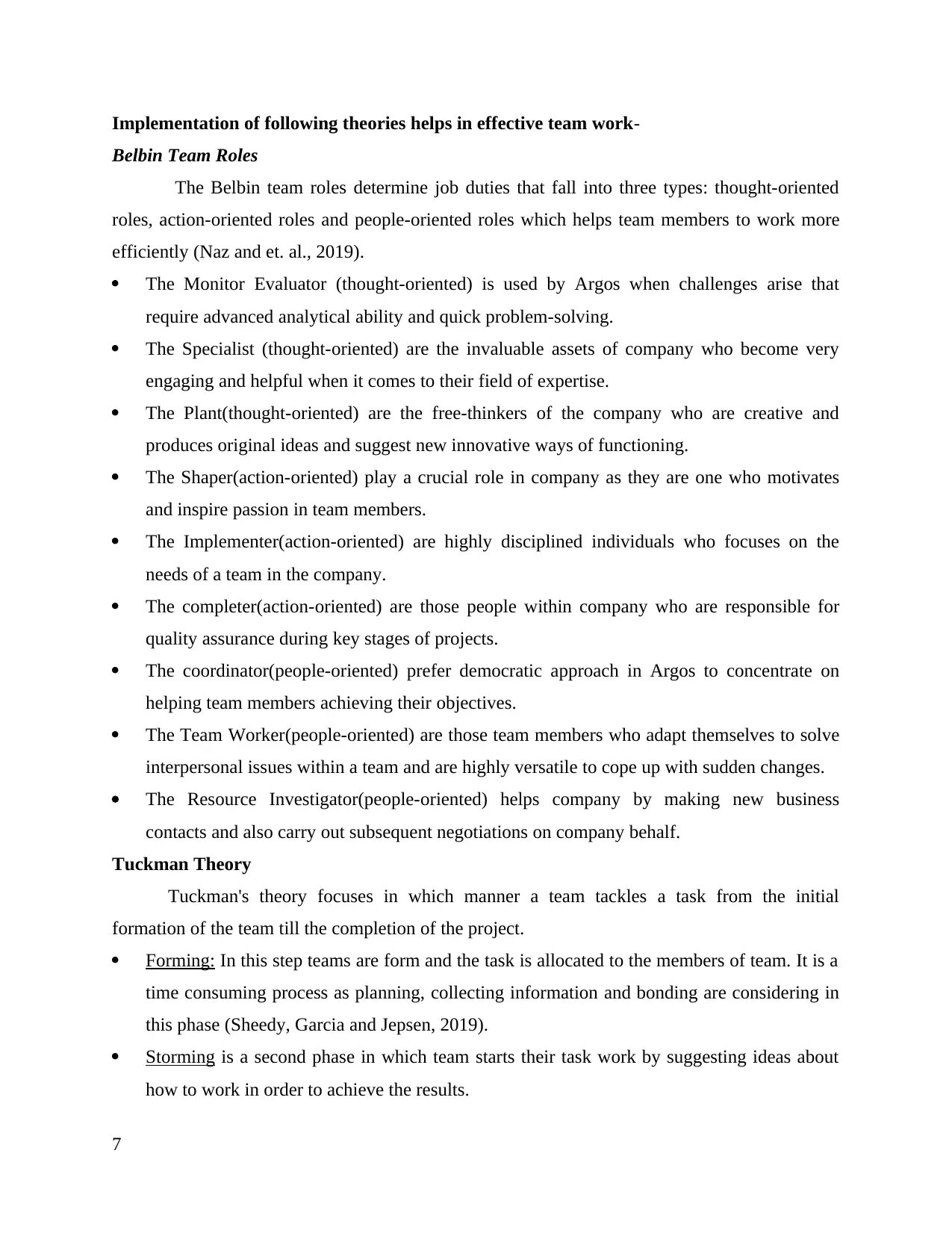
Implementation of following theories helps in effective team work-
Belbin Team Roles
The Belbin team roles determine job duties that fall into three types: thought-oriented
roles, action-oriented roles and people-oriented roles which helps team members to work more
efficiently (Naz and et. al., 2019).
The Monitor Evaluator (thought-oriented) is used by Argos when challenges arise that
require advanced analytical ability and quick problem-solving.
The Specialist (thought-oriented) are the invaluable assets of company who become very
engaging and helpful when it comes to their field of expertise.
The Plant(thought-oriented) are the free-thinkers of the company who are creative and
produces original ideas and suggest new innovative ways of functioning.
The Shaper(action-oriented) play a crucial role in company as they are one who motivates
and inspire passion in team members.
The Implementer(action-oriented) are highly disciplined individuals who focuses on the
needs of a team in the company.
The completer(action-oriented) are those people within company who are responsible for
quality assurance during key stages of projects.
The coordinator(people-oriented) prefer democratic approach in Argos to concentrate on
helping team members achieving their objectives.
The Team Worker(people-oriented) are those team members who adapt themselves to solve
interpersonal issues within a team and are highly versatile to cope up with sudden changes.
The Resource Investigator(people-oriented) helps company by making new business
contacts and also carry out subsequent negotiations on company behalf.
Tuckman Theory
Tuckman's theory focuses in which manner a team tackles a task from the initial
formation of the team till the completion of the project.
Forming: In this step teams are form and the task is allocated to the members of team. It is a
time consuming process as planning, collecting information and bonding are considering in
this phase (Sheedy, Garcia and Jepsen, 2019).
Storming is a second phase in which team starts their task work by suggesting ideas about
how to work in order to achieve the results.
7
Belbin Team Roles
The Belbin team roles determine job duties that fall into three types: thought-oriented
roles, action-oriented roles and people-oriented roles which helps team members to work more
efficiently (Naz and et. al., 2019).
The Monitor Evaluator (thought-oriented) is used by Argos when challenges arise that
require advanced analytical ability and quick problem-solving.
The Specialist (thought-oriented) are the invaluable assets of company who become very
engaging and helpful when it comes to their field of expertise.
The Plant(thought-oriented) are the free-thinkers of the company who are creative and
produces original ideas and suggest new innovative ways of functioning.
The Shaper(action-oriented) play a crucial role in company as they are one who motivates
and inspire passion in team members.
The Implementer(action-oriented) are highly disciplined individuals who focuses on the
needs of a team in the company.
The completer(action-oriented) are those people within company who are responsible for
quality assurance during key stages of projects.
The coordinator(people-oriented) prefer democratic approach in Argos to concentrate on
helping team members achieving their objectives.
The Team Worker(people-oriented) are those team members who adapt themselves to solve
interpersonal issues within a team and are highly versatile to cope up with sudden changes.
The Resource Investigator(people-oriented) helps company by making new business
contacts and also carry out subsequent negotiations on company behalf.
Tuckman Theory
Tuckman's theory focuses in which manner a team tackles a task from the initial
formation of the team till the completion of the project.
Forming: In this step teams are form and the task is allocated to the members of team. It is a
time consuming process as planning, collecting information and bonding are considering in
this phase (Sheedy, Garcia and Jepsen, 2019).
Storming is a second phase in which team starts their task work by suggesting ideas about
how to work in order to achieve the results.
7
⊘ This is a preview!⊘
Do you want full access?
Subscribe today to unlock all pages.

Trusted by 1+ million students worldwide
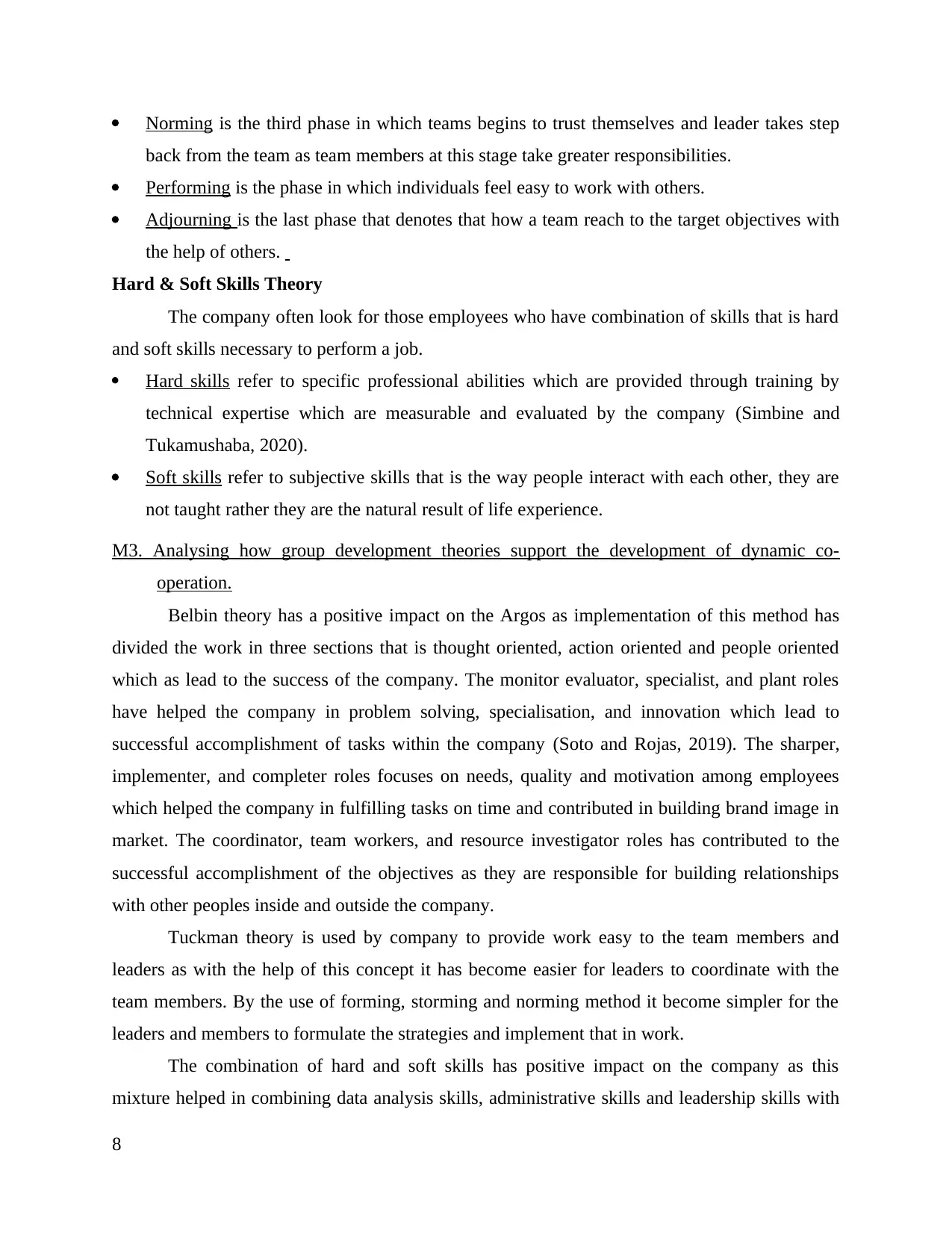
Norming is the third phase in which teams begins to trust themselves and leader takes step
back from the team as team members at this stage take greater responsibilities.
Performing is the phase in which individuals feel easy to work with others.
Adjourning is the last phase that denotes that how a team reach to the target objectives with
the help of others.
Hard & Soft Skills Theory
The company often look for those employees who have combination of skills that is hard
and soft skills necessary to perform a job.
Hard skills refer to specific professional abilities which are provided through training by
technical expertise which are measurable and evaluated by the company (Simbine and
Tukamushaba, 2020).
Soft skills refer to subjective skills that is the way people interact with each other, they are
not taught rather they are the natural result of life experience.
M3. Analysing how group development theories support the development of dynamic co-
operation.
Belbin theory has a positive impact on the Argos as implementation of this method has
divided the work in three sections that is thought oriented, action oriented and people oriented
which as lead to the success of the company. The monitor evaluator, specialist, and plant roles
have helped the company in problem solving, specialisation, and innovation which lead to
successful accomplishment of tasks within the company (Soto and Rojas, 2019). The sharper,
implementer, and completer roles focuses on needs, quality and motivation among employees
which helped the company in fulfilling tasks on time and contributed in building brand image in
market. The coordinator, team workers, and resource investigator roles has contributed to the
successful accomplishment of the objectives as they are responsible for building relationships
with other peoples inside and outside the company.
Tuckman theory is used by company to provide work easy to the team members and
leaders as with the help of this concept it has become easier for leaders to coordinate with the
team members. By the use of forming, storming and norming method it become simpler for the
leaders and members to formulate the strategies and implement that in work.
The combination of hard and soft skills has positive impact on the company as this
mixture helped in combining data analysis skills, administrative skills and leadership skills with
8
back from the team as team members at this stage take greater responsibilities.
Performing is the phase in which individuals feel easy to work with others.
Adjourning is the last phase that denotes that how a team reach to the target objectives with
the help of others.
Hard & Soft Skills Theory
The company often look for those employees who have combination of skills that is hard
and soft skills necessary to perform a job.
Hard skills refer to specific professional abilities which are provided through training by
technical expertise which are measurable and evaluated by the company (Simbine and
Tukamushaba, 2020).
Soft skills refer to subjective skills that is the way people interact with each other, they are
not taught rather they are the natural result of life experience.
M3. Analysing how group development theories support the development of dynamic co-
operation.
Belbin theory has a positive impact on the Argos as implementation of this method has
divided the work in three sections that is thought oriented, action oriented and people oriented
which as lead to the success of the company. The monitor evaluator, specialist, and plant roles
have helped the company in problem solving, specialisation, and innovation which lead to
successful accomplishment of tasks within the company (Soto and Rojas, 2019). The sharper,
implementer, and completer roles focuses on needs, quality and motivation among employees
which helped the company in fulfilling tasks on time and contributed in building brand image in
market. The coordinator, team workers, and resource investigator roles has contributed to the
successful accomplishment of the objectives as they are responsible for building relationships
with other peoples inside and outside the company.
Tuckman theory is used by company to provide work easy to the team members and
leaders as with the help of this concept it has become easier for leaders to coordinate with the
team members. By the use of forming, storming and norming method it become simpler for the
leaders and members to formulate the strategies and implement that in work.
The combination of hard and soft skills has positive impact on the company as this
mixture helped in combining data analysis skills, administrative skills and leadership skills with
8
Paraphrase This Document
Need a fresh take? Get an instant paraphrase of this document with our AI Paraphraser
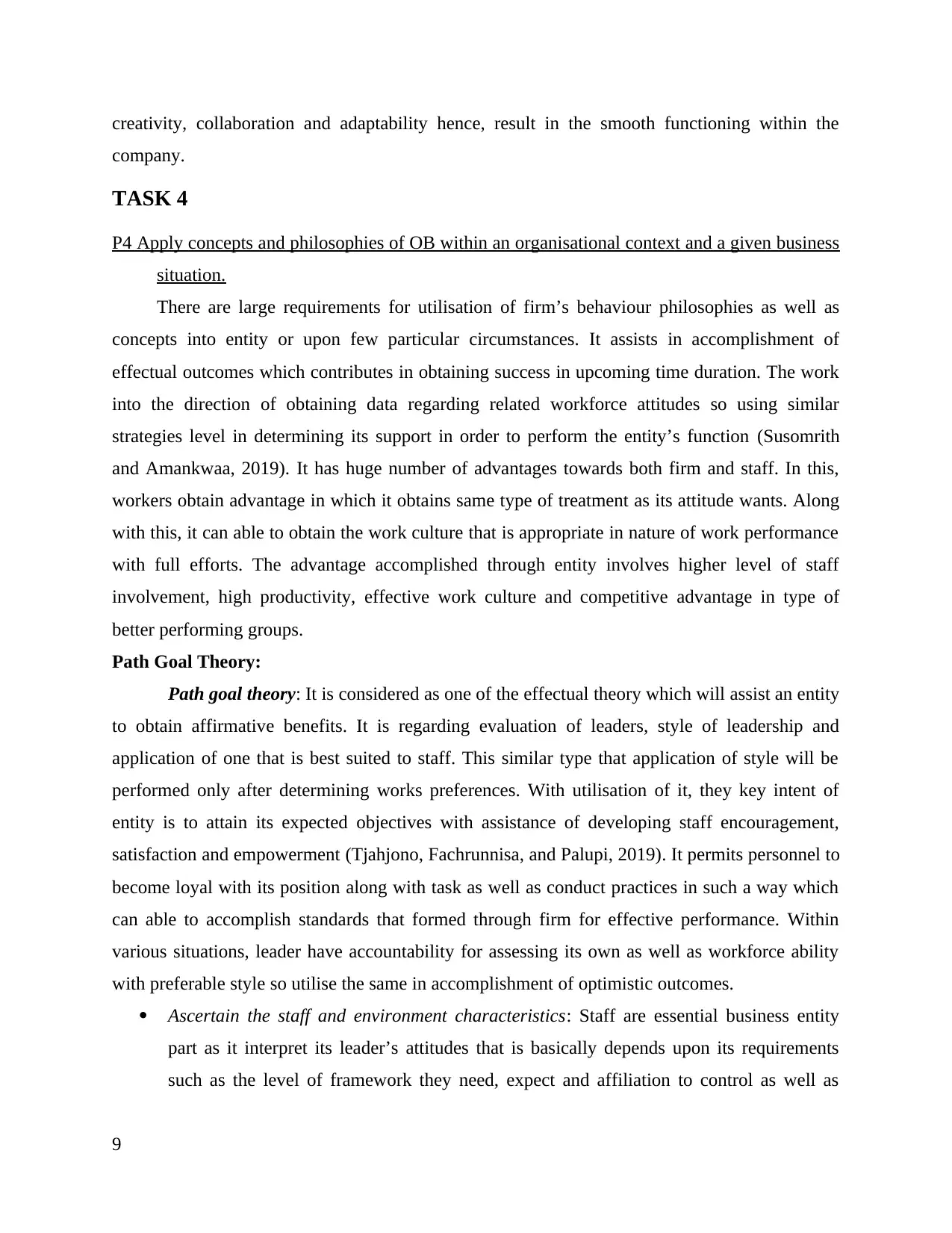
creativity, collaboration and adaptability hence, result in the smooth functioning within the
company.
TASK 4
P4 Apply concepts and philosophies of OB within an organisational context and a given business
situation.
There are large requirements for utilisation of firm’s behaviour philosophies as well as
concepts into entity or upon few particular circumstances. It assists in accomplishment of
effectual outcomes which contributes in obtaining success in upcoming time duration. The work
into the direction of obtaining data regarding related workforce attitudes so using similar
strategies level in determining its support in order to perform the entity’s function (Susomrith
and Amankwaa, 2019). It has huge number of advantages towards both firm and staff. In this,
workers obtain advantage in which it obtains same type of treatment as its attitude wants. Along
with this, it can able to obtain the work culture that is appropriate in nature of work performance
with full efforts. The advantage accomplished through entity involves higher level of staff
involvement, high productivity, effective work culture and competitive advantage in type of
better performing groups.
Path Goal Theory:
Path goal theory: It is considered as one of the effectual theory which will assist an entity
to obtain affirmative benefits. It is regarding evaluation of leaders, style of leadership and
application of one that is best suited to staff. This similar type that application of style will be
performed only after determining works preferences. With utilisation of it, they key intent of
entity is to attain its expected objectives with assistance of developing staff encouragement,
satisfaction and empowerment (Tjahjono, Fachrunnisa, and Palupi, 2019). It permits personnel to
become loyal with its position along with task as well as conduct practices in such a way which
can able to accomplish standards that formed through firm for effective performance. Within
various situations, leader have accountability for assessing its own as well as workforce ability
with preferable style so utilise the same in accomplishment of optimistic outcomes.
Ascertain the staff and environment characteristics: Staff are essential business entity
part as it interpret its leader’s attitudes that is basically depends upon its requirements
such as the level of framework they need, expect and affiliation to control as well as
9
company.
TASK 4
P4 Apply concepts and philosophies of OB within an organisational context and a given business
situation.
There are large requirements for utilisation of firm’s behaviour philosophies as well as
concepts into entity or upon few particular circumstances. It assists in accomplishment of
effectual outcomes which contributes in obtaining success in upcoming time duration. The work
into the direction of obtaining data regarding related workforce attitudes so using similar
strategies level in determining its support in order to perform the entity’s function (Susomrith
and Amankwaa, 2019). It has huge number of advantages towards both firm and staff. In this,
workers obtain advantage in which it obtains same type of treatment as its attitude wants. Along
with this, it can able to obtain the work culture that is appropriate in nature of work performance
with full efforts. The advantage accomplished through entity involves higher level of staff
involvement, high productivity, effective work culture and competitive advantage in type of
better performing groups.
Path Goal Theory:
Path goal theory: It is considered as one of the effectual theory which will assist an entity
to obtain affirmative benefits. It is regarding evaluation of leaders, style of leadership and
application of one that is best suited to staff. This similar type that application of style will be
performed only after determining works preferences. With utilisation of it, they key intent of
entity is to attain its expected objectives with assistance of developing staff encouragement,
satisfaction and empowerment (Tjahjono, Fachrunnisa, and Palupi, 2019). It permits personnel to
become loyal with its position along with task as well as conduct practices in such a way which
can able to accomplish standards that formed through firm for effective performance. Within
various situations, leader have accountability for assessing its own as well as workforce ability
with preferable style so utilise the same in accomplishment of optimistic outcomes.
Ascertain the staff and environment characteristics: Staff are essential business entity
part as it interpret its leader’s attitudes that is basically depends upon its requirements
such as the level of framework they need, expect and affiliation to control as well as
9
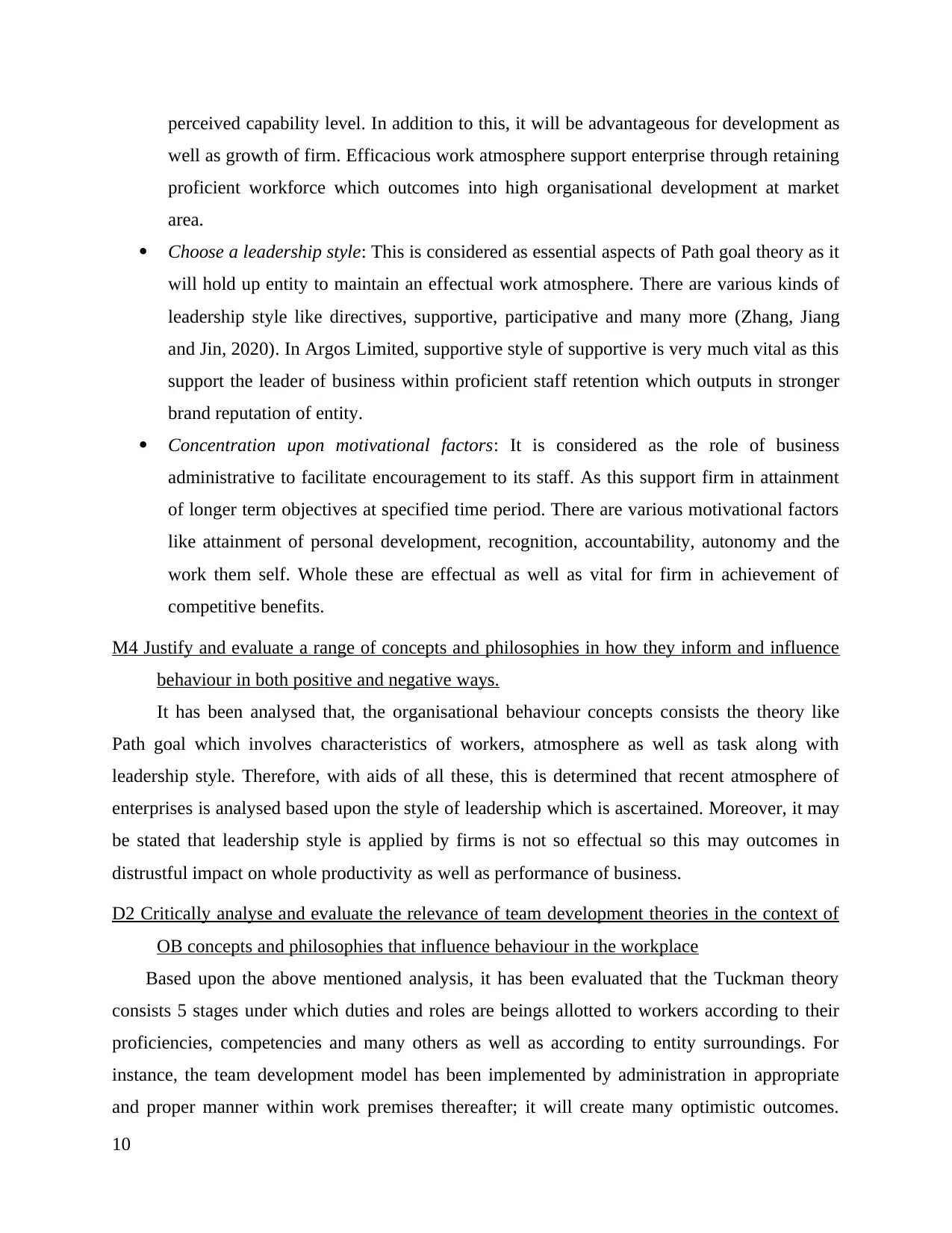
perceived capability level. In addition to this, it will be advantageous for development as
well as growth of firm. Efficacious work atmosphere support enterprise through retaining
proficient workforce which outcomes into high organisational development at market
area.
Choose a leadership style: This is considered as essential aspects of Path goal theory as it
will hold up entity to maintain an effectual work atmosphere. There are various kinds of
leadership style like directives, supportive, participative and many more (Zhang, Jiang
and Jin, 2020). In Argos Limited, supportive style of supportive is very much vital as this
support the leader of business within proficient staff retention which outputs in stronger
brand reputation of entity.
Concentration upon motivational factors: It is considered as the role of business
administrative to facilitate encouragement to its staff. As this support firm in attainment
of longer term objectives at specified time period. There are various motivational factors
like attainment of personal development, recognition, accountability, autonomy and the
work them self. Whole these are effectual as well as vital for firm in achievement of
competitive benefits.
M4 Justify and evaluate a range of concepts and philosophies in how they inform and influence
behaviour in both positive and negative ways.
It has been analysed that, the organisational behaviour concepts consists the theory like
Path goal which involves characteristics of workers, atmosphere as well as task along with
leadership style. Therefore, with aids of all these, this is determined that recent atmosphere of
enterprises is analysed based upon the style of leadership which is ascertained. Moreover, it may
be stated that leadership style is applied by firms is not so effectual so this may outcomes in
distrustful impact on whole productivity as well as performance of business.
D2 Critically analyse and evaluate the relevance of team development theories in the context of
OB concepts and philosophies that influence behaviour in the workplace
Based upon the above mentioned analysis, it has been evaluated that the Tuckman theory
consists 5 stages under which duties and roles are beings allotted to workers according to their
proficiencies, competencies and many others as well as according to entity surroundings. For
instance, the team development model has been implemented by administration in appropriate
and proper manner within work premises thereafter; it will create many optimistic outcomes.
10
well as growth of firm. Efficacious work atmosphere support enterprise through retaining
proficient workforce which outcomes into high organisational development at market
area.
Choose a leadership style: This is considered as essential aspects of Path goal theory as it
will hold up entity to maintain an effectual work atmosphere. There are various kinds of
leadership style like directives, supportive, participative and many more (Zhang, Jiang
and Jin, 2020). In Argos Limited, supportive style of supportive is very much vital as this
support the leader of business within proficient staff retention which outputs in stronger
brand reputation of entity.
Concentration upon motivational factors: It is considered as the role of business
administrative to facilitate encouragement to its staff. As this support firm in attainment
of longer term objectives at specified time period. There are various motivational factors
like attainment of personal development, recognition, accountability, autonomy and the
work them self. Whole these are effectual as well as vital for firm in achievement of
competitive benefits.
M4 Justify and evaluate a range of concepts and philosophies in how they inform and influence
behaviour in both positive and negative ways.
It has been analysed that, the organisational behaviour concepts consists the theory like
Path goal which involves characteristics of workers, atmosphere as well as task along with
leadership style. Therefore, with aids of all these, this is determined that recent atmosphere of
enterprises is analysed based upon the style of leadership which is ascertained. Moreover, it may
be stated that leadership style is applied by firms is not so effectual so this may outcomes in
distrustful impact on whole productivity as well as performance of business.
D2 Critically analyse and evaluate the relevance of team development theories in the context of
OB concepts and philosophies that influence behaviour in the workplace
Based upon the above mentioned analysis, it has been evaluated that the Tuckman theory
consists 5 stages under which duties and roles are beings allotted to workers according to their
proficiencies, competencies and many others as well as according to entity surroundings. For
instance, the team development model has been implemented by administration in appropriate
and proper manner within work premises thereafter; it will create many optimistic outcomes.
10
⊘ This is a preview!⊘
Do you want full access?
Subscribe today to unlock all pages.

Trusted by 1+ million students worldwide
1 out of 15
Related Documents
Your All-in-One AI-Powered Toolkit for Academic Success.
+13062052269
info@desklib.com
Available 24*7 on WhatsApp / Email
![[object Object]](/_next/static/media/star-bottom.7253800d.svg)
Unlock your academic potential
Copyright © 2020–2025 A2Z Services. All Rights Reserved. Developed and managed by ZUCOL.


